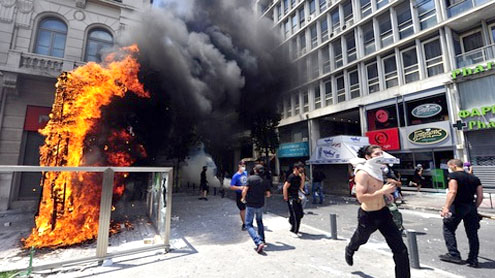 A general strike is under way in Greece, grounding flights, halting most public services and shutting offices and shops.
A general strike is under way in Greece, grounding flights, halting most public services and shutting offices and shops.
The 48-hour strike comes as parliament prepares to vote on the latest round of austerity measures, including more tax hikes, pay cuts and job losses.Greece is struggling to reduce a huge government deficit amid fears it may default and set off a eurozone crisis.The EU and IMF have demanded tough cuts in return for two bailouts.The BBC’s Chris Morris in Athens says the pace of protests in Greece has been increasing for several weeks.There have been lightning strikes across virtually every sector of the economy, with rubbish not collected and government ministries blockaded by their own workers.
The strike for Wednesday and Thursday has been called by the two big unions that cover public and private sector workers.Government departments, businesses, offices and stores are all expected to be shut, with small business owners and shopkeepers taking part in strike action for the first time.Air traffic controllers will stage a 12-hour walk-out. Trains, buses, taxis and lorries will not be operating.A strike over recent days by rubbish collectors has left uncollected waste piling in the streets.
“We are going to send a loud message to the government and the political system,” said Costas Tsikrikas, the head of the public workers’ union Adedy.”We believe participation will be huge,” he said.The strikers are planning to gather for demonstrations at 08:00 GMT in Athens and Thessaloniki.There were violent clashes outside parliament in Athens in June between police and protesters demanding an end to the measures.Legislators are voting on two bills on Wednesday and Thursday.
They include measures for higher taxes, further cuts to pensions and salaries and the suspension of collective labour agreements.They will also suspend 30,000 public servants on reduced pay and introduce a new civil service salary system.Prime Minister George Papandreou’s Pasok party has a four-seat majority but some of his backbenchers have threatened to vote against the measures.Late on Tuesday, Mr Papandreou appealed to his MPs for support.”We must persevere in this war as people, as a government, as a parliamentary group in order for the country to win it,” he said.
Greece finds itself with rising unemployment and a stalled economy, with a government debt that is 162% of its gross domestic product. The long-term bond markets have shut Greece out over fears that it can no longer meet its debt obligations.The EU and the IMF have stepped in with two rescue packages but the second has not been finalised.Meanwhile, Greece says it needs the next $11bn (£7bn; 8bn euros) instalment from the first package of bailout loans agreed last year or it will run out of money to pay its bills in November.
As part of the second bailout agreed to in July, Greece’s creditors agreed to a 21% loss – or “haircut” – on their loans to Athens, but there are suggestions this may not be enough.With fears the problems besetting Athens might spread to other highly indebted eurozone countries such as Spain and Italy, EU leaders meeting this weekend are scrambling to forge a plan that will protect the region from a Greek default.Measures could include propping up banks exposed to Greek debt and enlarging the eurozone’s rescue fund. – BBC











